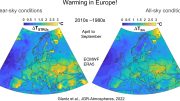
New research reveals that an extreme glacial cooling around 1.1 million years ago in southern Europe likely led to the extinction of early humans on the continent. This discovery challenges the previously held belief of continuous human occupation in Europe during that period. (Artist’s concept)
Paleoclimate evidence indicates that roughly 1.1 million years ago, there was a significant drop in temperature in southern Europe. This climate shift likely led to the disappearance of early human populations in the region, according to a new study led by UCL researchers.
The research, which was published in the journal Science, unveiled that previously unrecognized extreme glacial conditions took place about 1.1 million years ago. This intense cold spell made the European climate inhospitable for early humans, resulting in the continent being devoid of human inhabitants.
The oldest known human remains in Europe have previously been recovered from Iberia and suggest that early humans had arrived from southwest Αsia about 1.4 million years ago. The climate around that time would have generally been warm and wet, punctuated by mild cold periods. Up to now, the prevailing theory has been that once humans arrived, they were able to survive through multiple climate cycles and adapt to increasingly harsh conditions 900,000 years ago.
Senior author Professor Chronis Tzedakis (UCL Geography) said: “Our discovery of an extreme glacial cooling event around 1.1 million years ago challenges the idea of continuous early human occupation of Europe.”
Paleoclimate scientists from UCL, the University of Cambridge, and CSIC Barcelona analyzed the chemical composition of marine micro-organisms and examined the pollen content in a deep-sea sediment core recovered from off the coast of Portugal. This revealed the presence of abrupt climate changes that culminated in extreme glacial cooling, with ocean surface temperatures off Lisbon dropping below 6°C and semi-deserts expanding on the adjacent land.
A video highlighting how paleoclimate evidence shows that around 1.1 million years ago, the southern European climate cooled significantly and likely caused an extinction of early humans on the continent, according to a new study led by UCL researchers. Credit: UCL
Lead author Dr. Vasiliki Margari (UCL Geography) said: “To our surprise, we found that this cooling at 1.1 million years ago was comparable to some of the most severe events of recent ice ages.”
Co-author Professor Nick Ashton of the British Museum said: “A cooling of this magnitude would have placed small hunter-gatherer bands under considerable stress, especially since early humans may have lacked adaptations such as sufficient fat insulation and also the means to make fire, effective clothing or shelters.”
To assess the climate impact on early human populations, co-corresponding author Professor Axel Timmermann and his team from the IBS Center for Climate Physics at Pusan National University ran a climate simulation on their supercomputer Aleph to capture the extreme conditions during this time. Combining the output of the simulation with fossil and archaeological evidence of human occupation in southwest Eurasia, the team then developed a human habitat model, which predicts how suitable the environment was for early human occupation.
Professor Axel Timmermann said: “The results showed that 1.1 million years ago climate around the Mediterranean became too hostile for archaic humans.”
Together, the paleoclimate data and human habitat model results indicate that Iberia, and more generally southern Europe, was depopulated during the Early Pleistocene. An apparent lack of stone tools and human remains over the next 200,000 years further raises the possibility of a long-lasting hiatus in European occupation.
Co-author Professor Chris Stringer of the Natural History Museum in London said: “According to this scenario, Europe may have been recolonized around 900,000 years ago by more resilient humans with evolutionary or behavioral changes that allowed survival in the increasing intensity of glacial conditions.”
Reference: “Extreme glacial cooling likely led to hominin depopulation of Europe in the Early Pleistocene” by Vasiliki Margari, David A. Hodell, Simon A. Parfitt, Nick M. Ashton, Joan O. Grimalt, Hyuna Kim, Kyung-Sook Yun, Philip L. Gibbard, Chris B. Stringer, Axel Timmermann and Polychronis C. Tzedakis, 10 August 2023, Science.
DOI: 10.1126/science.adf4445
The research was led by scientists at UCL Geography and the IBS Center for Climate Physics, Pusan National University, South Korea in partnership with researchers from the Cambridge University, CSIC Barcelona, the Natural History Museum, London, the British Museum and the UCL Institute of Archaeology.









Be the first to comment on "Europe’s Ancient Freeze: New Study Reveals Ancient Cooling Wiped Out Early Humans"